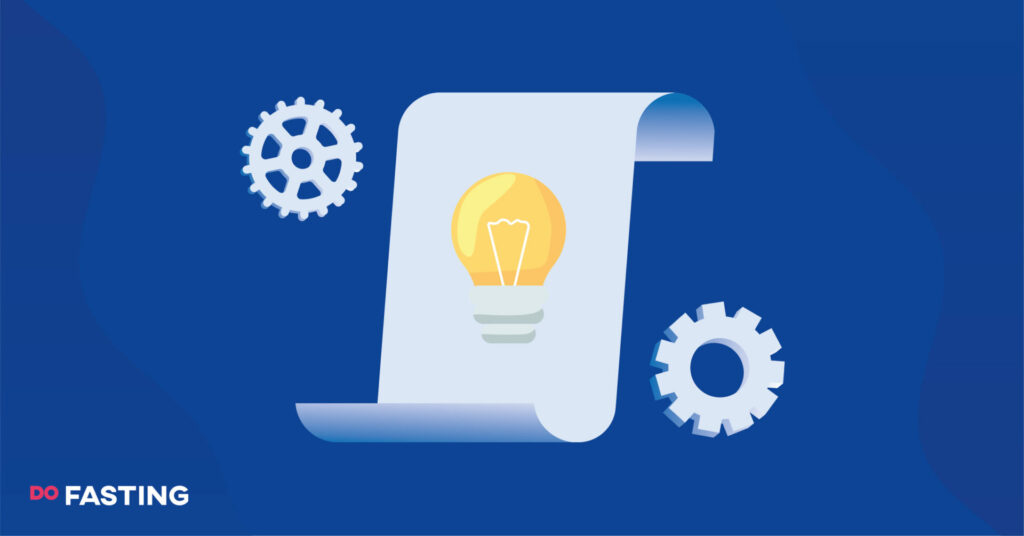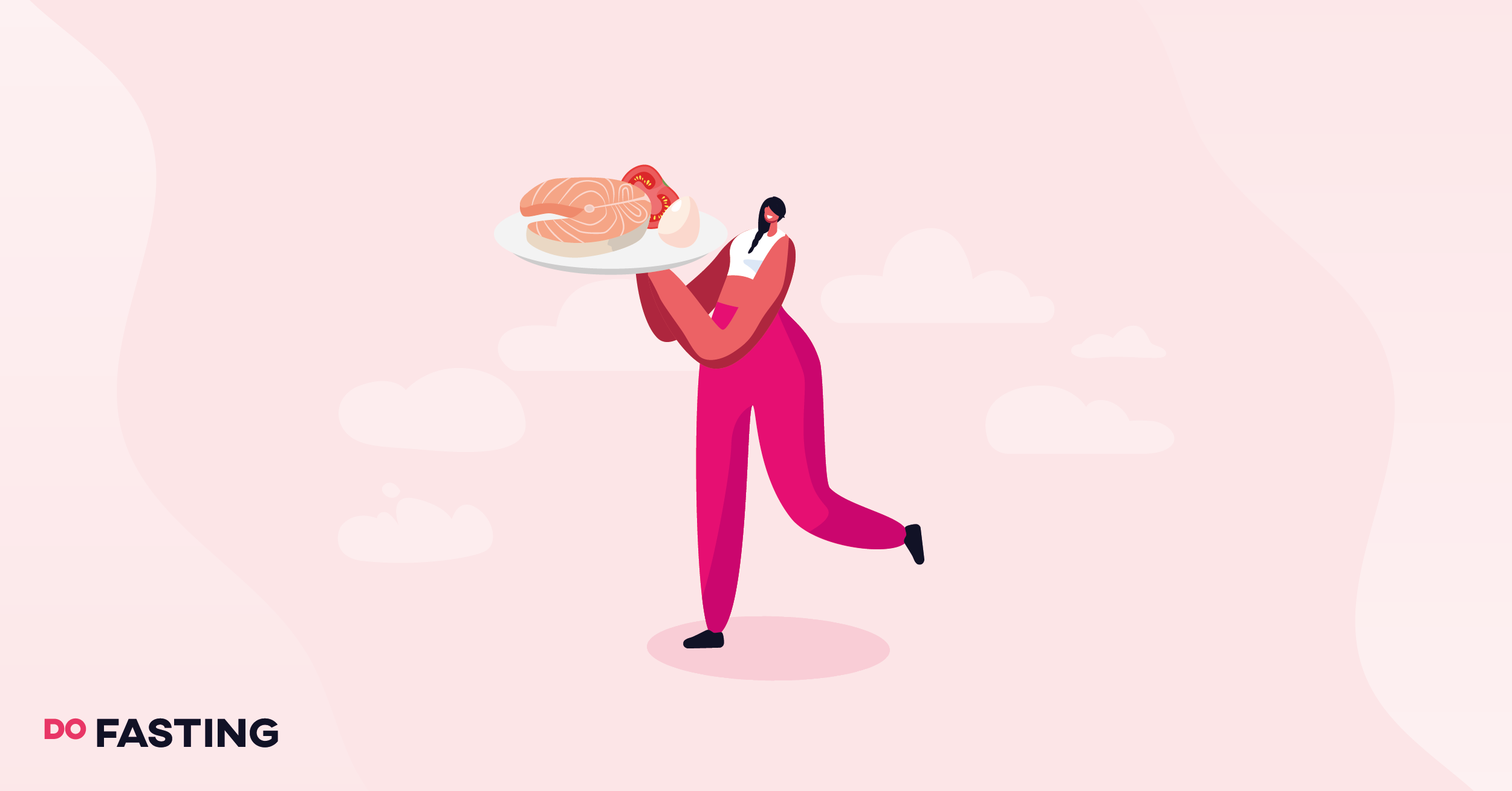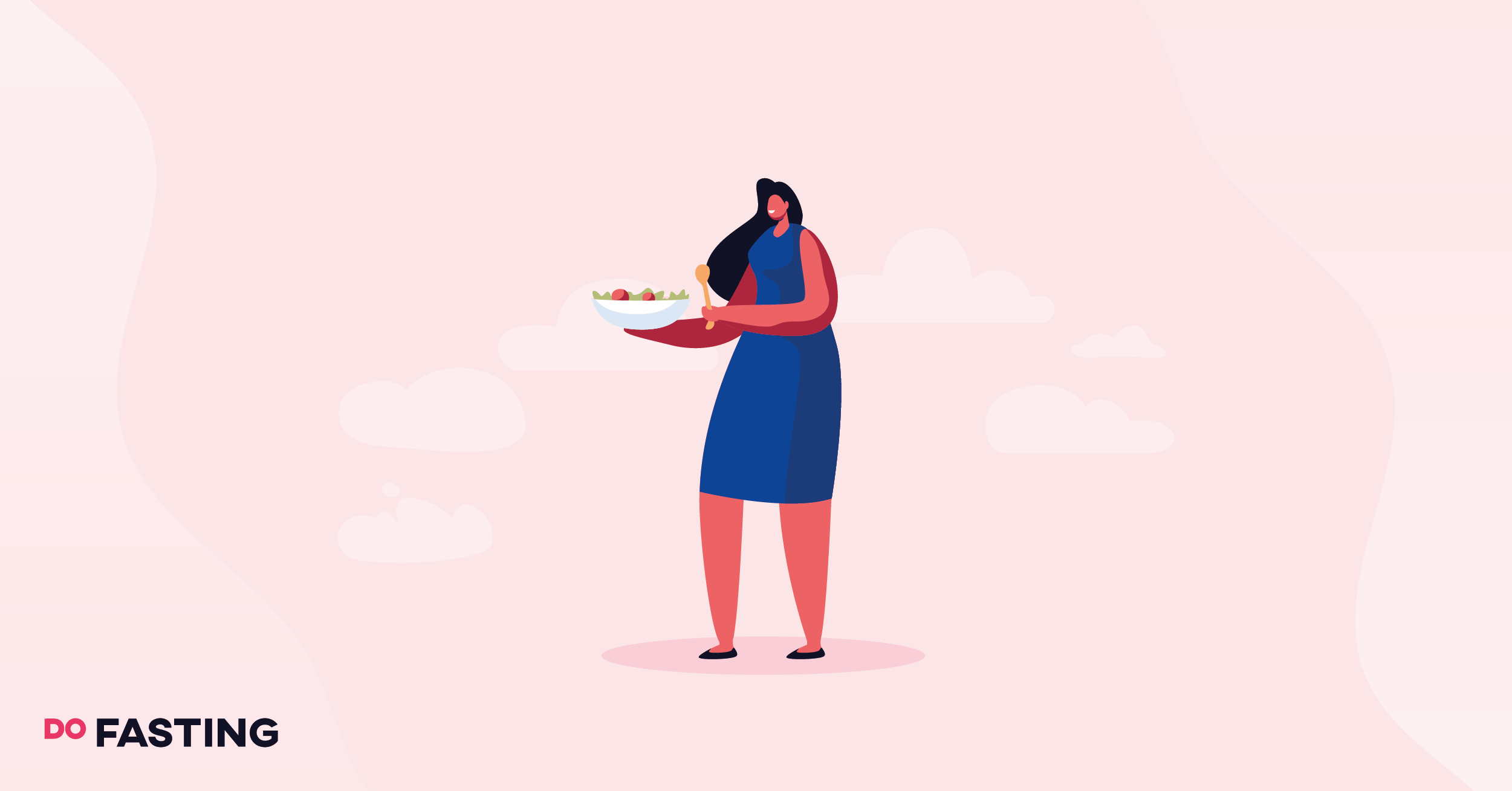Contents
How to do a 48-hour fast?
To complete a two-day fast, you basically need to stop eating for two full days. During the fast, you can only consume zero-calorie beverages, like unsweetened black coffee, water, and any supplements that will not break your fast.
A typical week for someone who is undertaking a two-day fast could look something like this:
- Monday evening, stop eating at 7PM after your evening meal
- Fast throughout all of Tuesday and Wednesday until 7PM
- Wednesday 7PM you should begin eating again and slowly ease your body out of the prolonged fasting state.
On eating days, you should follow standard eating patterns, ensuring you get enough of the required micro and macronutrients to support your health. You should also keep track of your calorie intake so that you do not overeat on non-fasting days.
The 48-hour method of fasting can feel intimidating to anyone who has never tried it before. Apps like the DoFasting app can help ease you into the intermittent fasting methods, making it feel less overwhelming.
The Dofasting app includes 5000+ IF-friendly recipes, guidance for each day of your schedule, and reminders on when to drink water. The app will notify you about your fasting periods, and the timer will let you know when your next fast starts and your current fast ends. There is also a calorie tracker to ensure you don’t exceed your calorie intake on eating days.
You can read a detailed user review of the DoFasting app, tried and tested by Calm Sage, to understand how the application can ease your intermittent fasting journey.
Take a
1-minute quiz
and discover how much weight you can lose with DoFasting!

What are the benefits of a 48-hour fast?
The main health benefits of intermittent fasting include:
- Improves brain function
- Enhances digestion
- Reduces glucose levels
- Improves blood pressure and cholesterol
- Reduces oxidative stress and inflammation in the body
- May help prevent cancer
- May extend your lifespan, helping you live longer
- May help prevent Alzheimer’s disease
The 48-hour method of intermittent fasting comes with many of these health benefits, and we have summarized each of them below.
Weight loss
Intermittent fasting is a commonly used method of weight loss. It triggers weight loss in a number of ways. These include: restricting your daily caloric intake, inducing a state of ketosis during fasting periods, and increasing metabolism.
To begin with, time-restricted eating naturally forces a reduction in your daily caloric intake. Eating at a calorie deficit, and therefore burning more calories than you take in, is the best method there is for weight loss.
When you begin restricting the time you can eat, you will find a calorie deficit becomes easier to maintain, helping to boost weight loss. It is important, though, to maintain normal eating patterns on your non-fasting days to avoid overeating.
Secondly, prolonged fasting induces the metabolic state of ketosis in the body. Ketosis means that the body stops burning blood sugar for energy and is instead forced to burn stored fat. Your body can go into ketosis after 12 hours of fasting.
Lastly, fasting has been shown to increase metabolic activity which helps you burn more calories more quickly, supporting weight loss.
Autophagy
Increased autophagy is another of the health benefits of fasting.
Research suggests that intermittent fasting may increase autophagy in the body. Autophagy literally means ‘self-eating’ and is the process by which cells are recycled and replaced in the body. Reduced autophagy can be linked to aging and age-related illnesses, like rheumatoid arthritis and cancer.
Increasing autophagy in your body may promote longevity and reduce your risk of developing a range of illnesses by delaying cell aging.
Fasting is thought to trigger autophagy. During periods of not eating, the process of autophagy breaks down broken cellular material and uses it in processes where it is needed to keep the body going.
Significant autophagy is thought to be induced after 2–4 days of fasting and is thought to begin when insulin and glucose levels drop in the blood.
Improves insulin resistance
Fasting is thought to help improve your body’s insulin sensitivity which can reduce your risk of developing type 2 diabetes. Reduced insulin sensitivity is a common precursor of type 2 diabetes. Insulin sensitivity refers to the cells in your body’s ability to respond correctly to insulin levels in the blood.
During a fast, your blood sugar levels are lowered, which could also benefit blood sugar regulation and increase insulin sensitivity.
Some people have found intermittent fasting to be an effective tool to manage their type 2 diabetes and reduce the symptoms. However, anyone with type 2 diabetes must monitor their glucose levels during a fast as hypoglycemia is a risk.
Potential drawbacks
Though it comes with many health benefits, fasting for 48 hours can be difficult, and if you feel unwell while fasting, you should stop immediately.
Below, we have summarized a few of the potential drawbacks of fasting and why these may occur.
Hunger and dizziness
Severe hunger may occur if you are refraining from eating for 48 hours. This hunger may also make you feel dizzy and faint.
Many frequent fasters claim that your body will acclimatize to these feelings and that this drawback is only temporary. However, we would recommend beginning with a less-challenging intermittent fasting style to slowly introduce your body to fasting.
Good IF methods to begin with include the 12-hour fast or the 16:8 fasting method.
Exhaustion and sluggishness
Fasting for longer than 24 hours means that your body’s levels of stored carbs drop. This causes your body to start burning fat and can result in feeling sluggish and tired.
As with hunger levels, these feelings tend to decrease as your body gets used to these periods of fasting, but, again, beginning with a less challenging intermittent fasting style may help.
48-hour fast may interfere with social eating
Fasting for 48 hours could get in the way of your social life. If you frequently eat out and socialize with friends, you may find it difficult to stick to this length of fast. You could try arranging your schedule around your fast to deal with this drawback.
If you find that the two-day fasting style interferes too much with your social life, you could opt for another, more flexible style of fasting, like the 5:2 method or the 24-hour fast.
Take a
1-minute quiz
and discover how much weight you can lose with DoFasting!

Tips on how to minimize side effects fast
Below, we have recommended a few ways that you can reduce the risks of these drawbacks and make your fasting experience more manageable.
- Drink enough water – Staying hydrated is incredibly important when fasting. You can drink zero-calorie beverages, like green tea and water, to help your body remain hydrated.
- Include some sodium into your water to replace essential electrolytes – Electrolytes are lost during fasting, so it is important to replace them where you can. You could even try electrolyte tablets, provided they do not break your fast.
- Drinking tea or black coffee can reduce some hunger pangs – Hunger pangs can be challenging to navigate, but unsweetened black tea, green tea, and coffee can reduce them somewhat.
- Before starting such a fast, eat whole grains, protein, and fat-rich food – Eating the nutrients your body needs can help prepare your body for such a long fast. You could also include an Essential Fiber Complex in your pre-fasting diet to ensure that your body gets the nutrients it needs. This complex from DoFasting provides your body with key nutrients, including fiber, to help you feel fuller and reduce your appetite as you begin your fast. Each serving contains only 10kcal.
- Keeping yourself busy with hobbies, meditation, and books – If you’re not thinking about your hunger, then you’re not going to notice it as much. Keep busy during your fasting period, but don’t do anything too strenuous as you could exhaust yourself.
How to break a 48-hour fast?
After fasting such a long period you should ease your body back into eating. Below we’ve explained how you can do this.
Foods to eat after a 48-hour fast
After not eating for 48 hours, your digestive system will not handle heavy foods well. To break a two-day fast, you should slowly reintroduce food to avoid overstimulating and aggravating your gut. If you don’t do this slowly, it could lead to bloating, nausea, and diarrhea.
Good foods to eat as a small meal after a 48-hour fast include:
- Smoothies containing fruits and vegetables
- Dried fruits
- Soups
- Cooked vegetables, preferably steamed until soft
- Fermented foods, like yogurt and kefir
- Healthy fats, like eggs and avocados
Be gentle with your digestive system when you finish fasting, and don’t overload it. Remember to eat a small meal for your first meal after a long-duration fast.
Ensure that you don’t overeat and stick to your calorie limit and healthy lifestyle on eating days.
Foods to avoid after a two-day fast
Foods you should totally avoid after a two-day fast include:
- Fast food and other junk food that is high in trans fats
- Refined carbohydrates, like white bread and white pasta
- Sweets and anything with a high refined sugar content
- Processed foods, particularly processed meats
These foods can be difficult to digest and can result in a quick blood sugar spike which can be harmful. Slowly reintroducing foods helps your body to readjust.
Is a 48-hour fast safe?
Intermittent fasting has been used successfully by many to lose weight and improve overall health in many ways.
Among its benefits, it can reduce body fat and blood pressure, increase insulin sensitivity, and even reduce symptoms of conditions like rheumatoid arthritis by reducing inflammation. However, intermittent fasting and the two-day fast are not designed for everyone.
There are some groups who should not try any method of intermittent fasting, including the 48-hour method. These include:
- People with type 1 diabetes
- People who have low blood pressure
- Anyone with a history of eating disorders or who is currently suffering from eating disorders
- People who are breastfeeding or pregnant
- People taking certain medications, including insulin, blood thinners, and nonsteroidal anti-inflammatory drugs (medications like nonsteroidal anti-inflammatory drugs and blood thinners may require food to be effective)
Take a
1-minute quiz
and discover how much weight you can lose with DoFasting!

Conclusion
The 48-hour method of intermittent fasting is a popular style of time-restricted eating that has been shown to help people to lose weight. Along with its ability to boost weight loss, intermittent fasting comes with many other health benefits, making it such an attractive dieting method.
Fasting for extended periods can be hard on the body, so you should try less-challenging methods of fasting first and slowly work your way up to this level of fasting. Side effects may include hunger, dizziness, and exhaustion.
There are some groups who should not try the 48-hour method of fasting. Still, for everyone else, a two-day fast is a safe method of dieting, provided that they listen to their body, prepare correctly, and stop fasting immediately if they feel unwell.
See how DoFasting will improve your life
Find out what works for you with this 60-sec quiz approved by our experts and get your personal revolutionary fasting assistant.
Start the Quiz
This is an evidence-based article that includes scientific citations. DoFasting’s professional writers and editors prepared the content, which a team of medical experts verified to be accurate.















